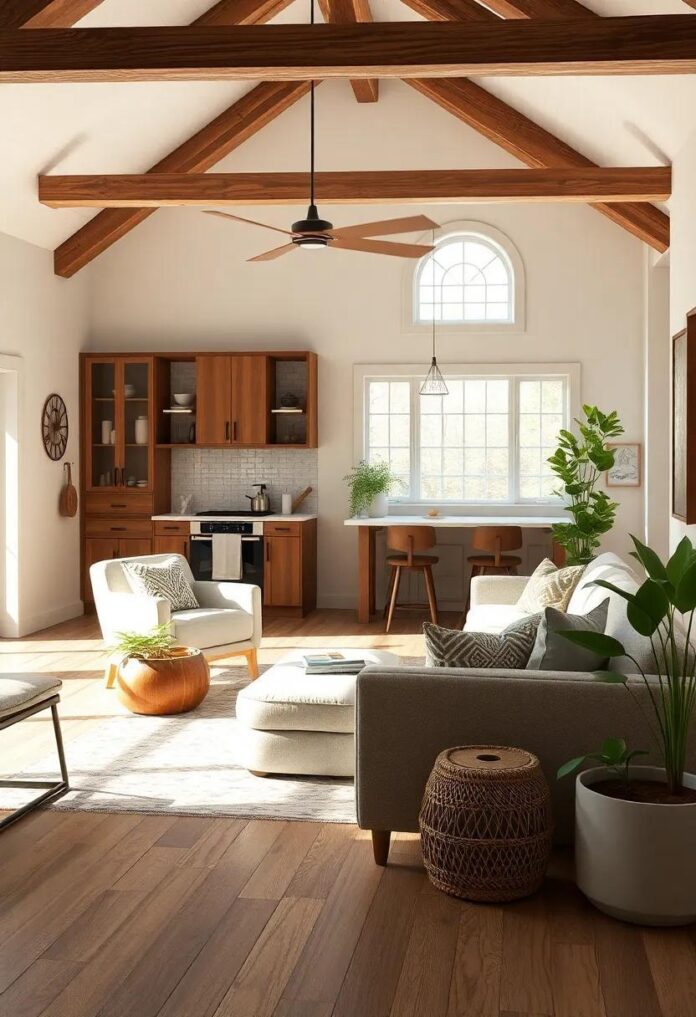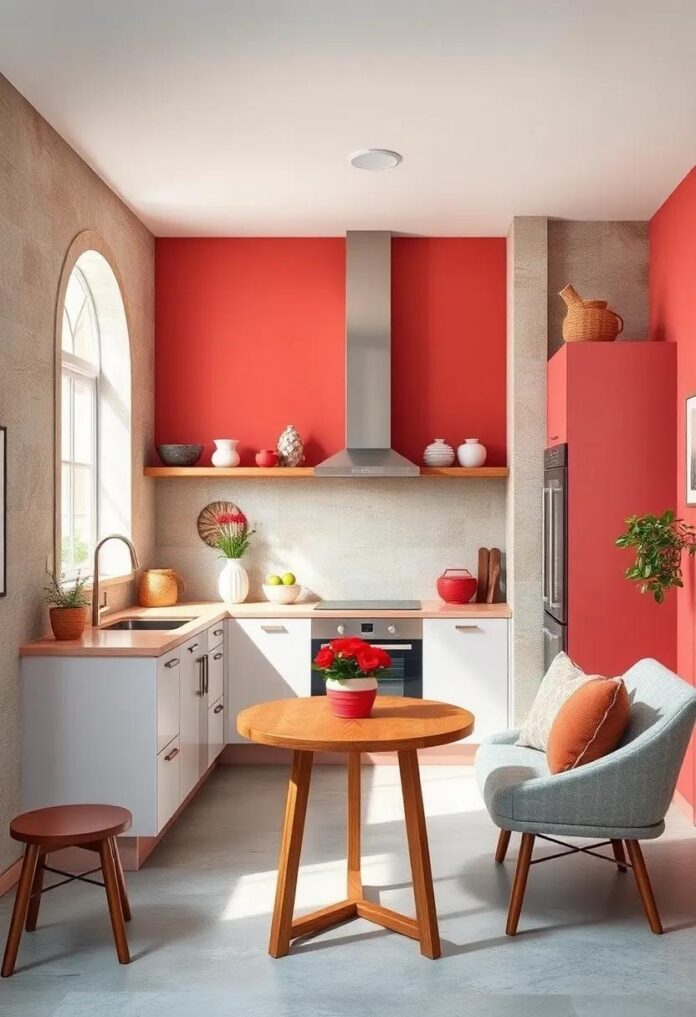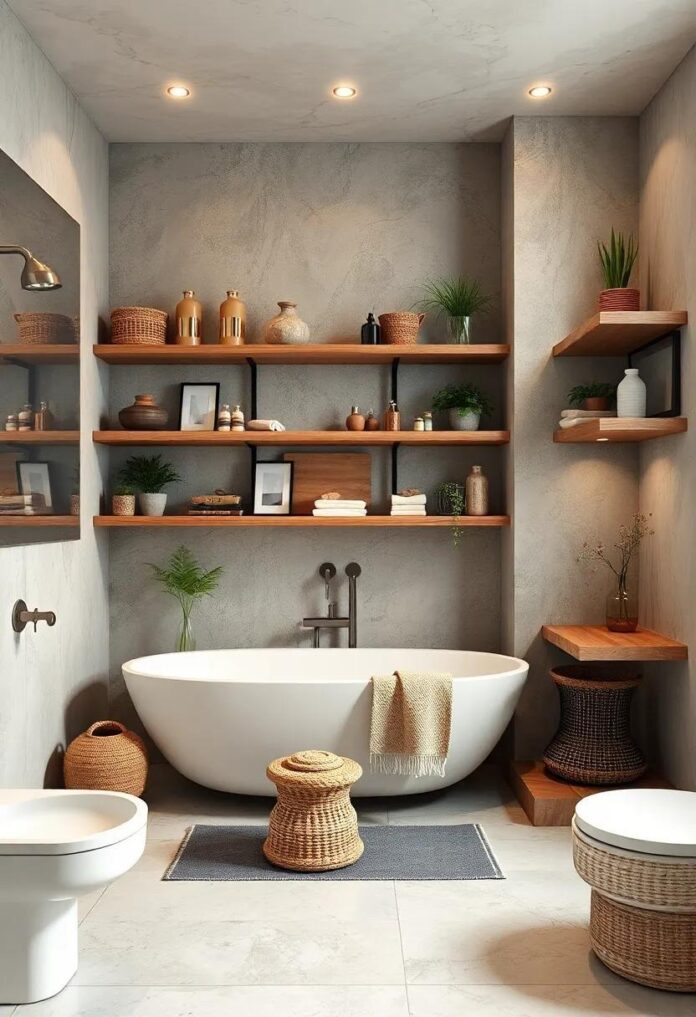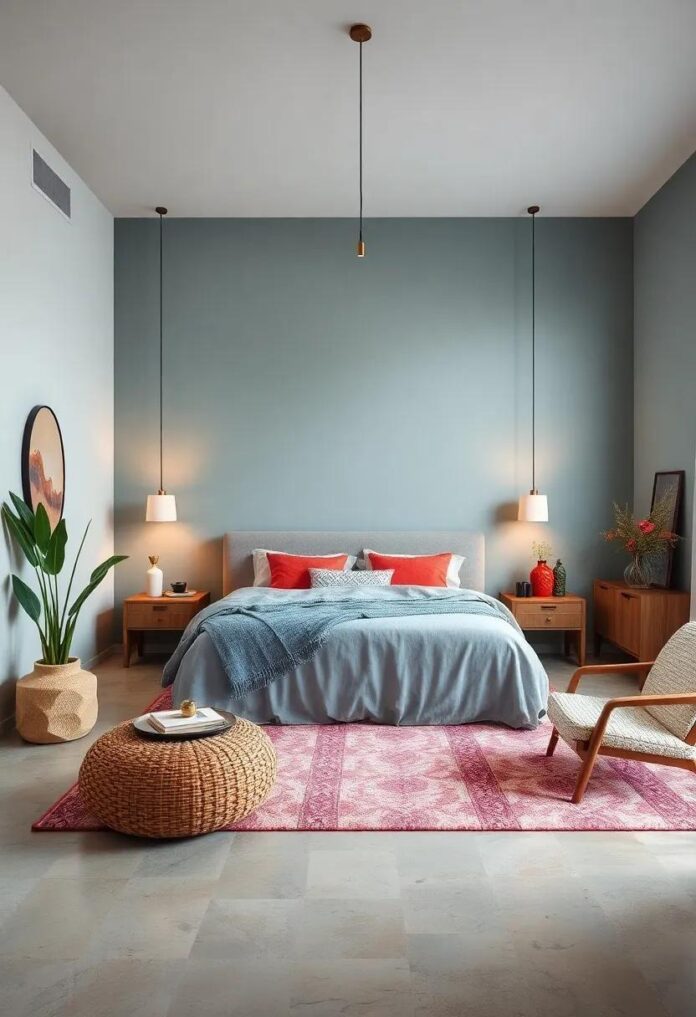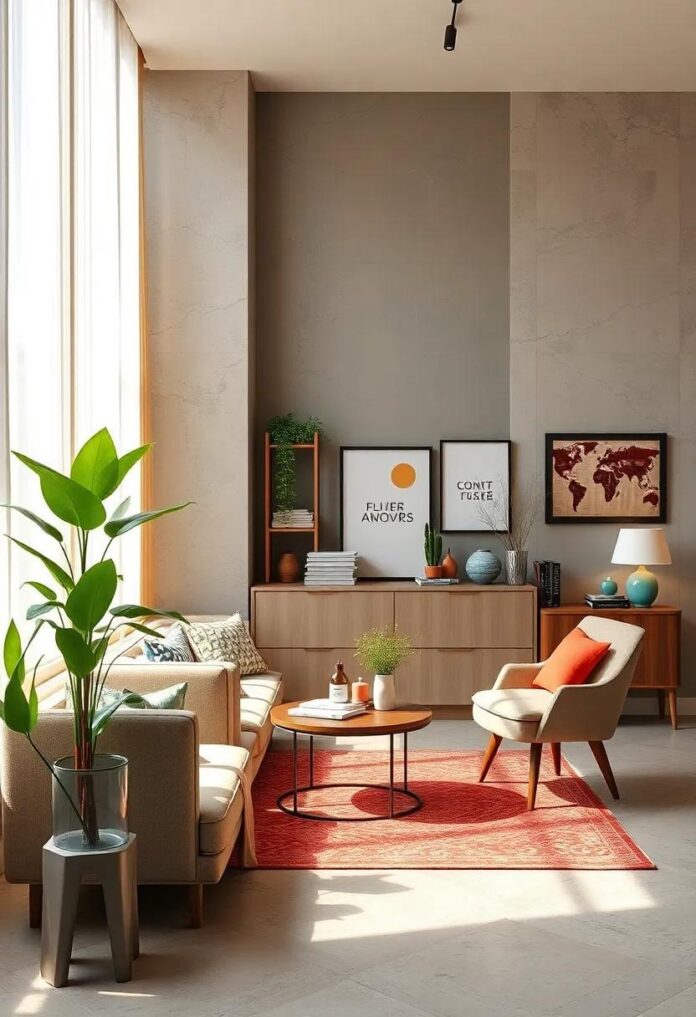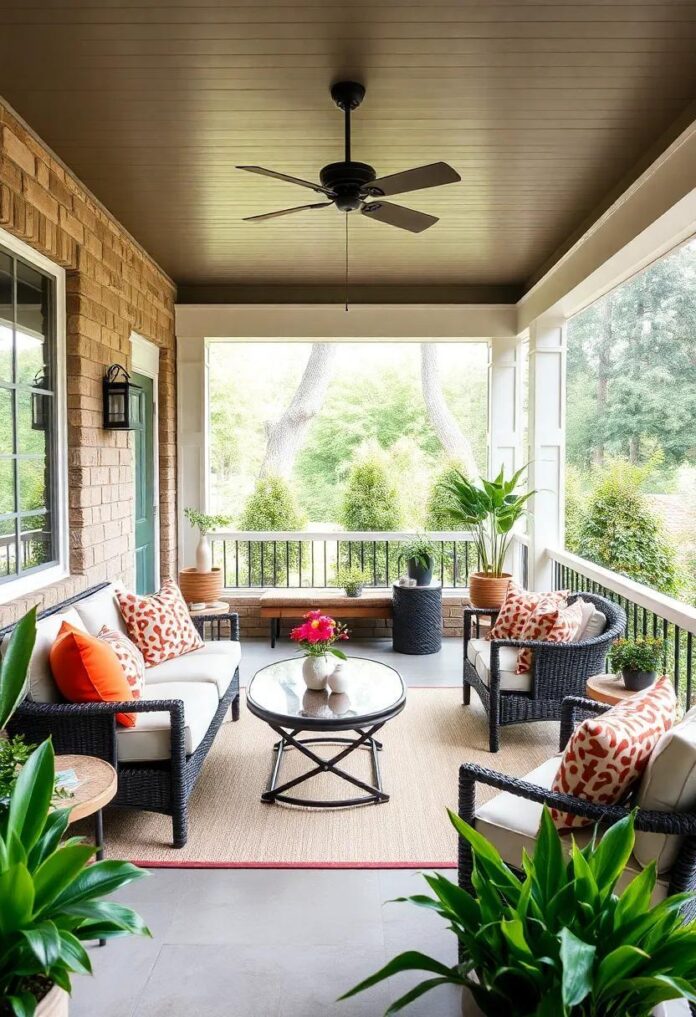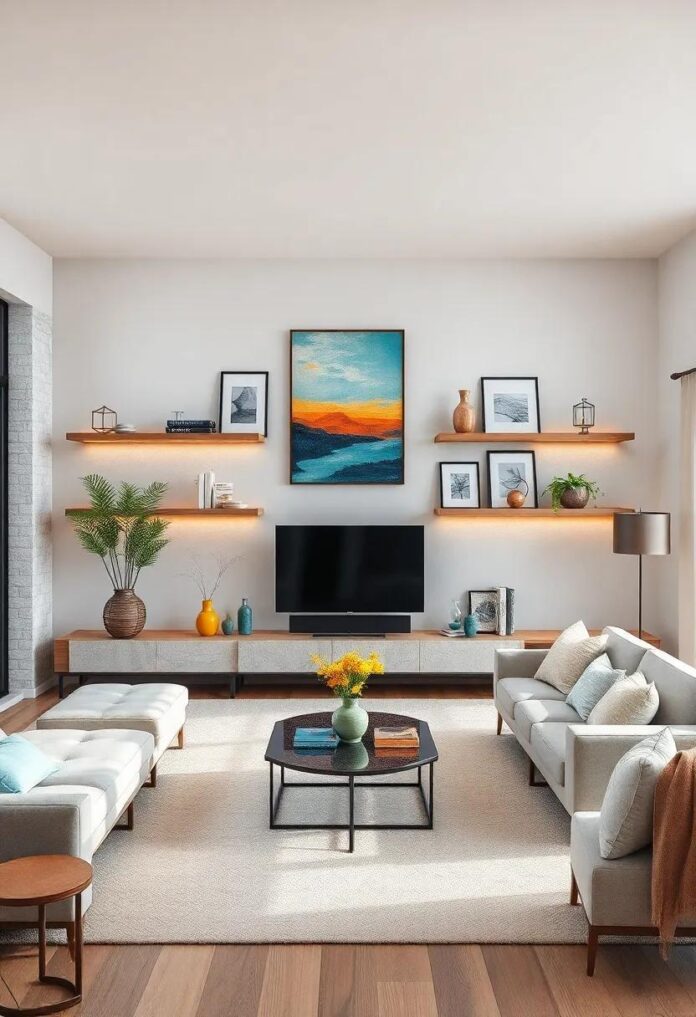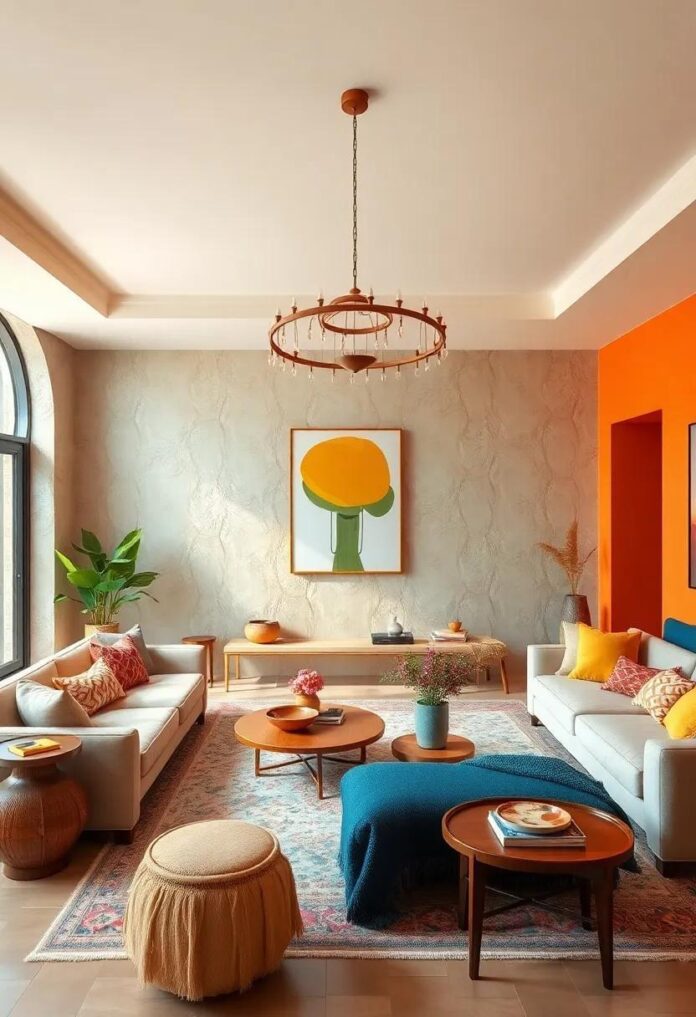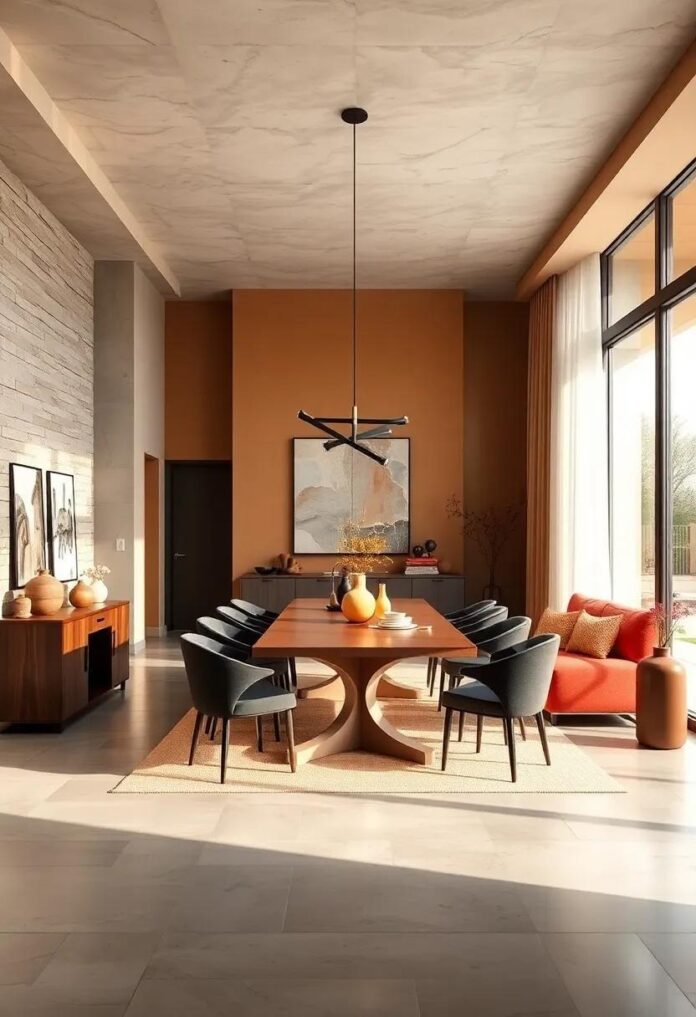In today’s fast-paced world, the comforting embrace of a home designed for connection and warmth has never been more essential. At the heart of this haven, the farmhouse-style aesthetic shines, evoking a sense of nostalgia while seamlessly integrating into modern open concept living. This article delves into the art of creating welcoming spaces where the rustic charm of a farmhouse meets the versatile functionality of contemporary design. From inviting kitchens that beckon family gatherings to spacious living rooms promoting shared moments,discover how to blend cozy aesthetics with practicality. Join us on a journey to transform your living environment into a harmonious oasis that celebrates both comfort and style,inviting you to relax,create,and connect.
Welcoming Open Spaces That Blend Comfort and Functionality in Farmhouse Designs
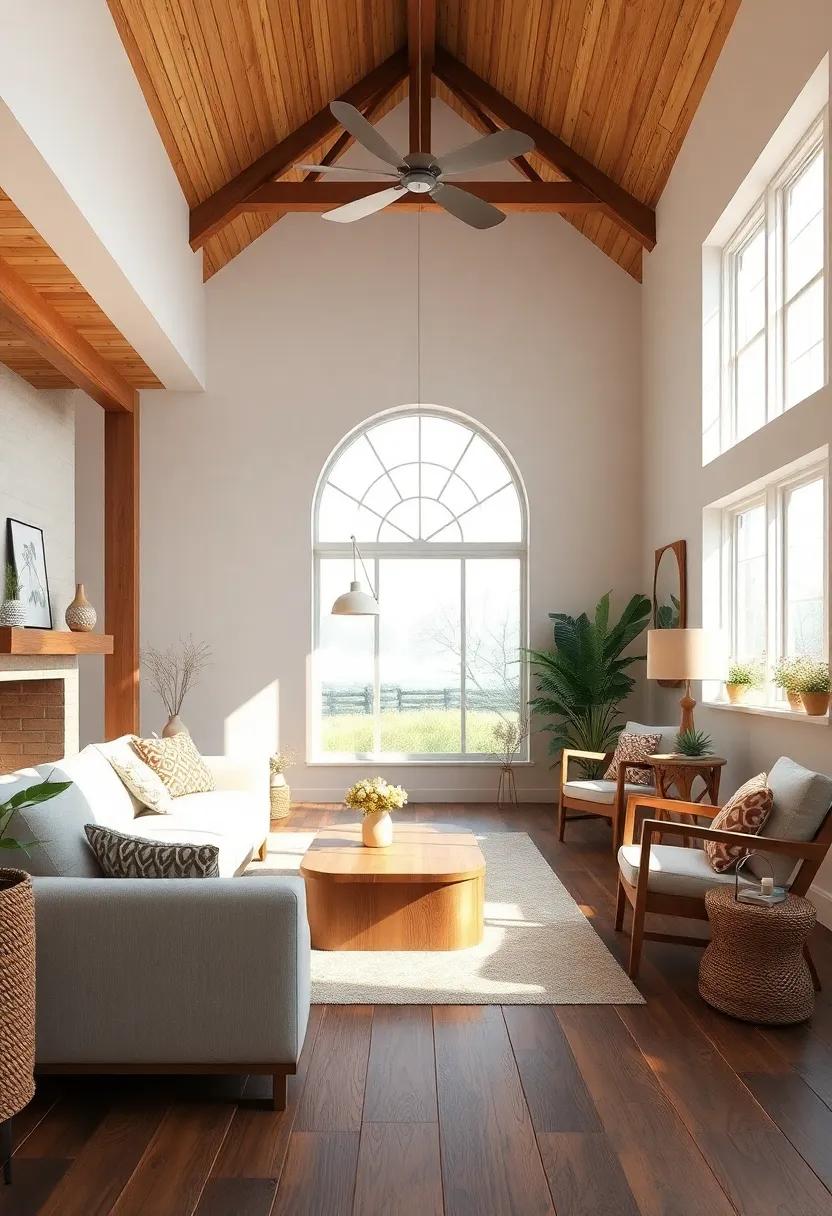
In the ever-evolving world of interior design,the farmhouse aesthetic has become synonymous with open spaces that foster warmth and unity. The seamless integration of living rooms and kitchens creates an inviting atmosphere, perfect for both family gatherings and intimate moments. Emphasizing natural materials such as reclaimed wood, stone accents, and cozy textiles, thes designs evoke a sense of nostalgia while catering to modern functionality. Take advantage of large windows that flood the area with natural light, ensuring that each corner feels airy and bright. Consider incorporating features like shiplap walls or a central island to enhance the charm, while also serving as a practical gathering point for meals and conversations alike.
To achieve a harmonious flow between these essential spaces,it’s beneficial to choose a cohesive color palette that reflects nature’s warmth. Soft neutrals with splashes of rustic hues can create a tranquil environment, making it easy to transition from cooking to relaxation. Including elements such as open shelving for easy access to kitchen essentials, and strategically placed seating options, can significantly enhance usability. Here’s a quick overview of key design elements to consider:
| Element | Purpose |
|---|---|
| Reclaimed Wood | Brings texture and warmth |
| Large Windows | Enhances natural light |
| Open Shelving | Provides easy access and displays |
| Central Island | Acts as a social hub |
Balancing comfort and functionality in farmhouse designs allows for spaces that are not only gorgeous but also deeply lived-in. Embrace the concept of zoning within the open layout by using furniture to define separate areas while maintaining an overarching sense of continuity. Think of area rugs,varied lighting fixtures,and strategically placed potted plants as tools to create distinct,inviting niches for cooking,dining,and relaxing. By merging the aesthetic appeal of farmhouse design with practical elements, homeowners can cultivate welcoming environments that resonate with both charm and livability.
Creating a Cozy Atmosphere with Rustic Textures and Natural Elements
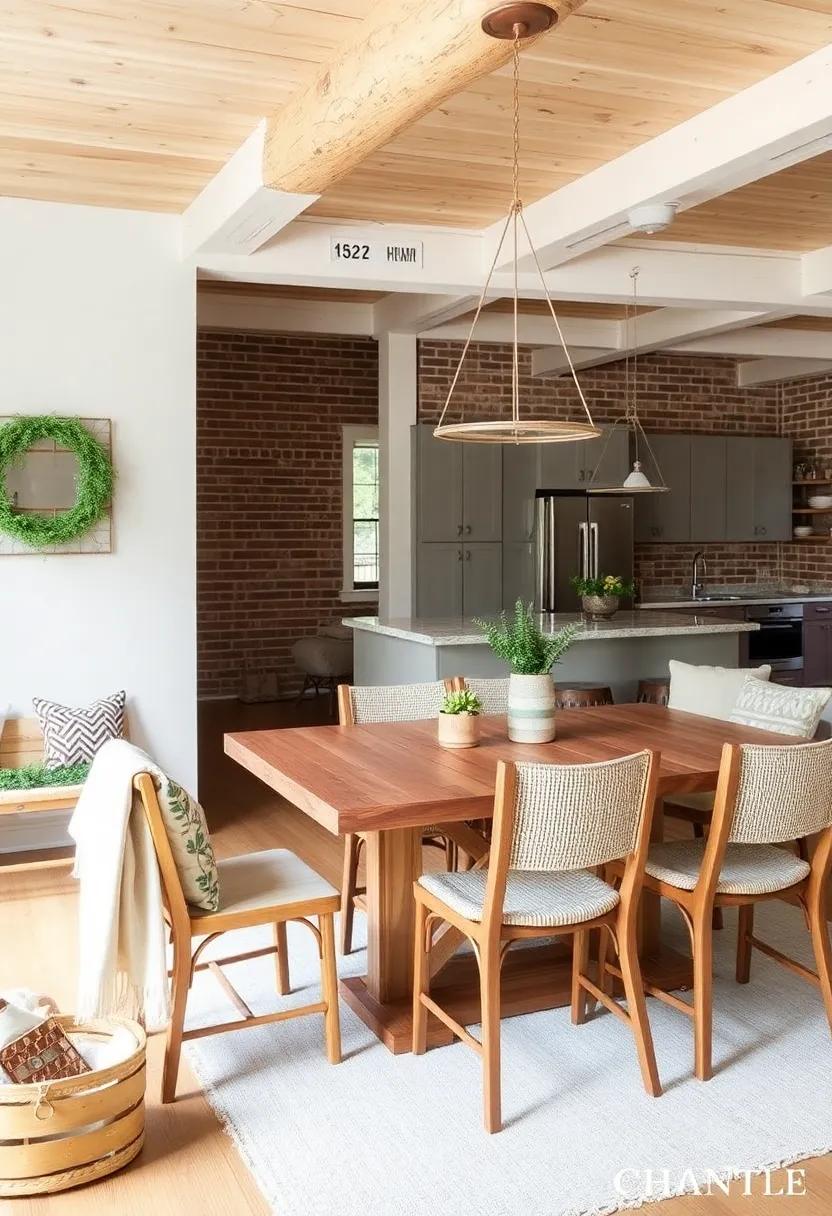
To cultivate a warm and inviting space, incorporating rustic textures and natural elements is key. Begin by selecting furnishings that blend charm and functionality. A weathered wood dining table, coupled with a set of mismatched chairs, can create a casual yet stylish focal point in your open concept living area. Consider layering with soft textiles like linen throw blankets or woven cushions that add comfort while enhancing the tactile experience of the room.Elements such as exposed brick walls or reclaimed wood ceilings can serve as stunning backdrops, connecting the indoors with nature and building a sense of serenity.
integrating plants and organic materials can further enhance the cozy vibe. Add potted herbs or succulents to your kitchen counter for both aesthetic appeal and functionality. A chic hanging planter or a vintage wooden crate can elevate the decor while promoting a connection to the outdoors. To tie everything together, consider textural contrasts, such as combining sleek metals with rustic finishes. Here are a few key elements to keep in mind:
- Wood Accents: Use reclaimed wood shelves or beams.
- Natural Fabrics: Opt for cotton or burlap in your textiles.
- Earthy Colors: Choose a palette inspired by nature, including greens, browns, and soft creams.
Inviting Neutral Color Palettes That Highlight Farmhouse Charm
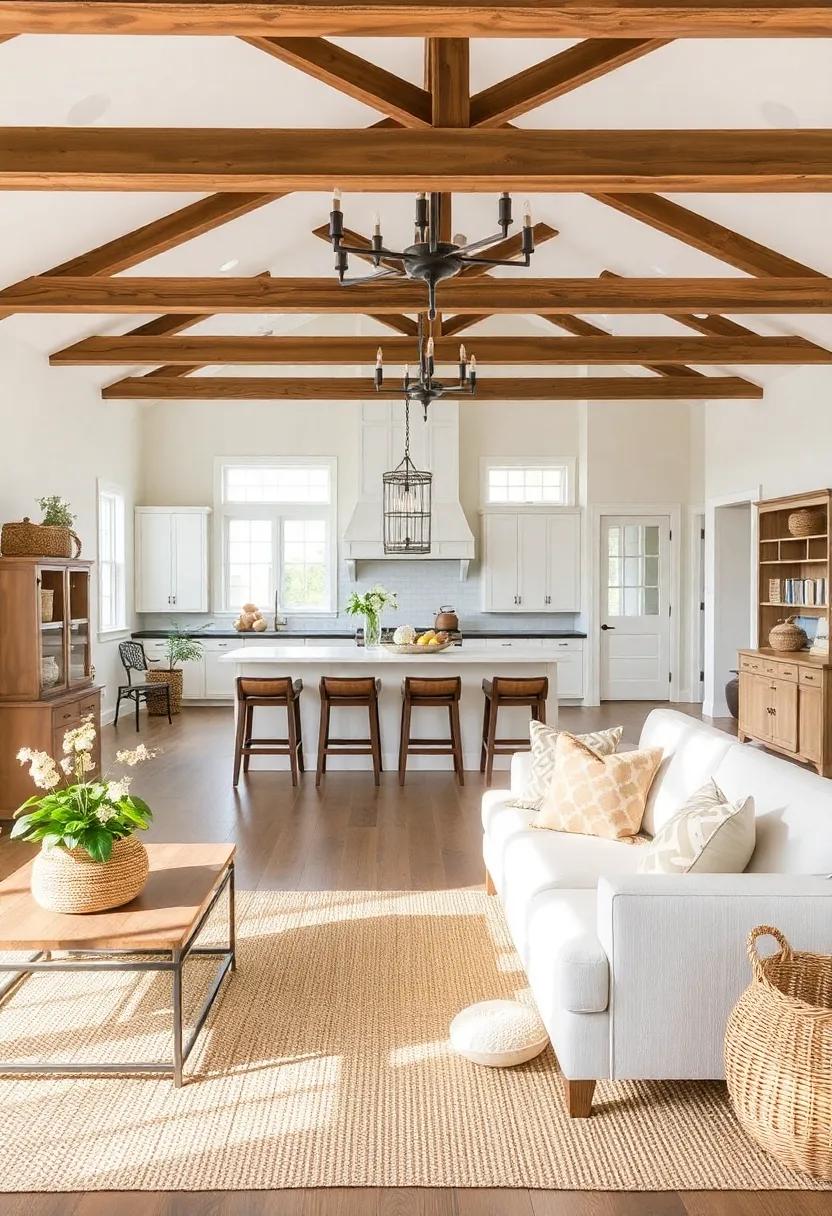
When designing an open-concept living room and kitchen, a neutral color palette plays a vital role in accentuating the timeless charm of farmhouse style. Soft hues such as gentle whites, warm beiges, and faded grays provide a serene backdrop, allowing natural light to fill the space and create an inviting atmosphere. These shades can be punctuated with rustic elements like reclaimed wood beams,vintage furniture,and elegant textile patterns that breathe character into the room.
To achieve a cohesive farmhouse look, consider incorporating natural textures and finishes alongside your chosen colors. Here are some elements to blend seamlessly with your palette:
- Distressed Wood Accents: Incorporate tables and shelving made from reclaimed wood.
- Natural Fabrics: Use cotton, linen, and jute in cushions and curtains for a cozy touch.
- Earthy Decor: Accessorize with pottery, woven baskets, and potted plants to enhance the organic feel.
| Color | Description |
|---|---|
| Soft White | Brightens the space and mixes well with other colors. |
| Warm Beige | adds warmth and depth,perfect for creating cozy nooks. |
| Faded Gray | Offers a modern touch while maintaining rustic charm. |
Incorporating Natural Light to Enhance Open Living Areas
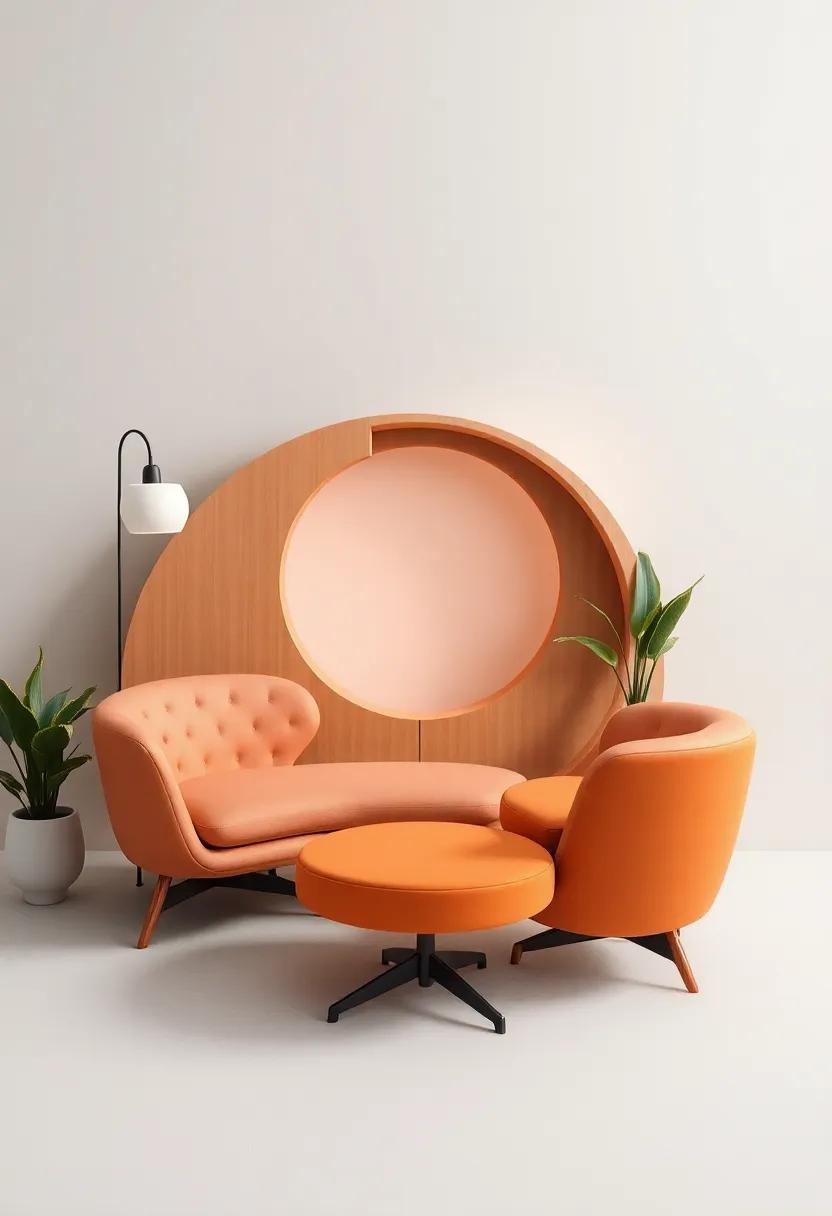
Maximizing the use of natural light can dramatically transform open living areas, especially in farmhouse-style designs where warmth and openness are key themes.Start by considering the positioning of windows and doors: opting for larger panes or even sliding glass doors can create a seamless connection between indoor and outdoor spaces,inviting daylight to fill the room. Utilize sheer curtains to allow sunlight to filter in while maintaining privacy. Additionally, incorporating features like skylights or clerestory windows can not only increase natural light but also enhance the vertical space, making the area feel airy and expansive.
Another effective strategy is to choose a light color palette for walls and furnishings; shades of white,beige,and soft pastels reflect light beautifully,enhancing the overall illumination of the space.When selecting your decor, consider materials that can amplify this effect, such as glass and mirrors. Position mirrors strategically to bounce light around the room. Here’s a handy table illustrating the best practices for improving natural light in your farmhouse-style open living areas:
| Feature | Description |
|---|---|
| Large Windows | Expand views and allow maximum sunlight. |
| Light Colors | Use whites and pastels for walls to reflect light. |
| Sheer Fabrics | choose curtains that diffuse light gently. |
| Mirrors | Strategically place mirrors to enhance brightness. |
| Skylights | Add overhead lighting without sacrificing wall space. |
Showcasing Statement Furniture Pieces in Farmhouse-Style Open Layouts
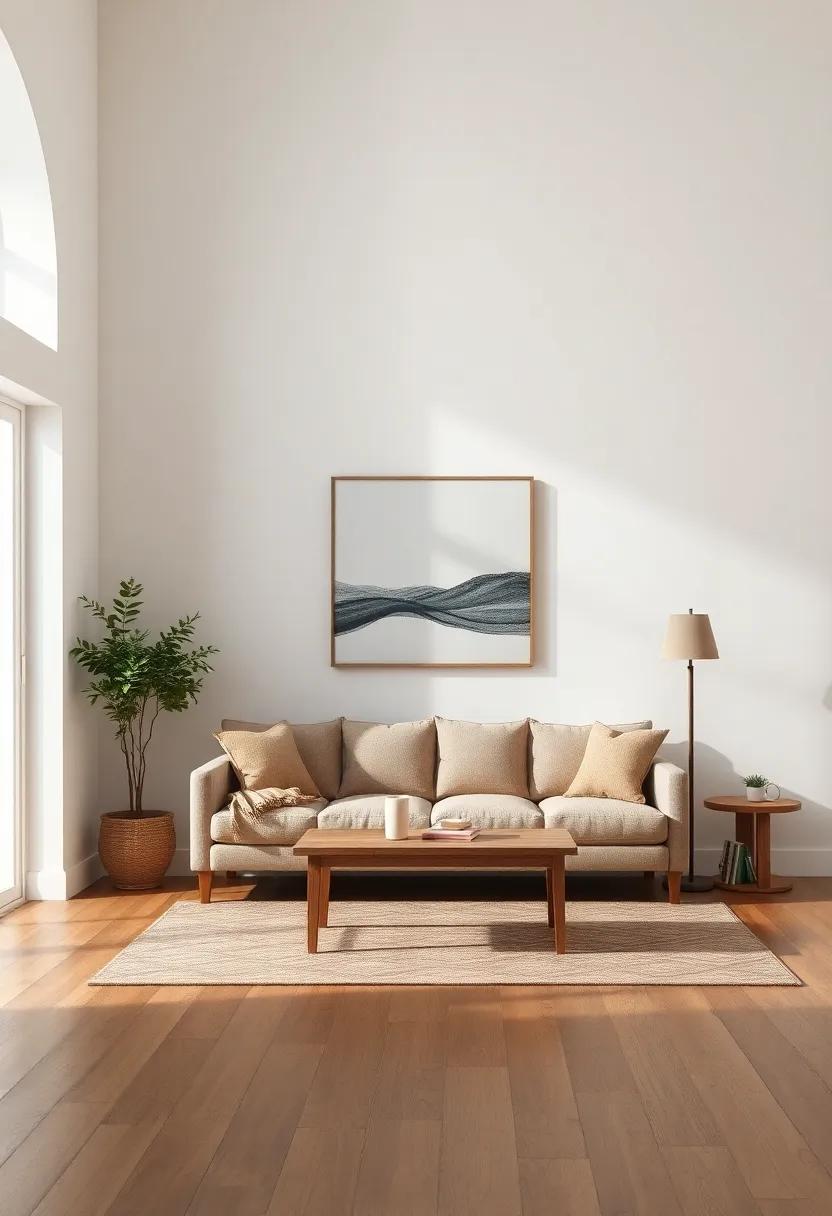
in a farmhouse-style open layout, statement furniture pieces serve as the soul of the space, infusing the home with personality and warmth. Opt for large, rustic dining tables crafted from reclaimed wood as a centerpiece, which not only offers ample seating for family gatherings but also acts as an inviting focal point. Pair these tables with mismatched chairs in soft linens or distressed finishes to achieve a curated yet effortless look. Introducing a statement sofa in a bold hue or rich texture can also complement the natural tones of the farmhouse aesthetic, creating a harmonious balance between comfort and style.
To enhance the charm of your open concept,consider incorporating items that tell a story. Unique accent pieces such as vintage sideboards or handcrafted coffee tables made from salvaged materials can elevate the design while emphasizing sustainability. Displaying decorative elements like ceramic vases, woven baskets, or aged copper accents can further highlight your personal style. For a cohesive look, keep the color palette earthy and neutral, and let each piece shine without overwhelming the space. Here’s a quick reference table for styling ideas:
| Furniture Piece | Material | Suggested Color |
|---|---|---|
| Dining Table | Reclaimed Wood | Natural Oak |
| Accent Sofa | Velvet | Deep Green |
| Coffee Table | Metal and Wood | Rustic Brown |
| Chair Set | Mixed Materials | Soft Beige |
Emphasizing Farmhouse Features with Vintage Decor Accents
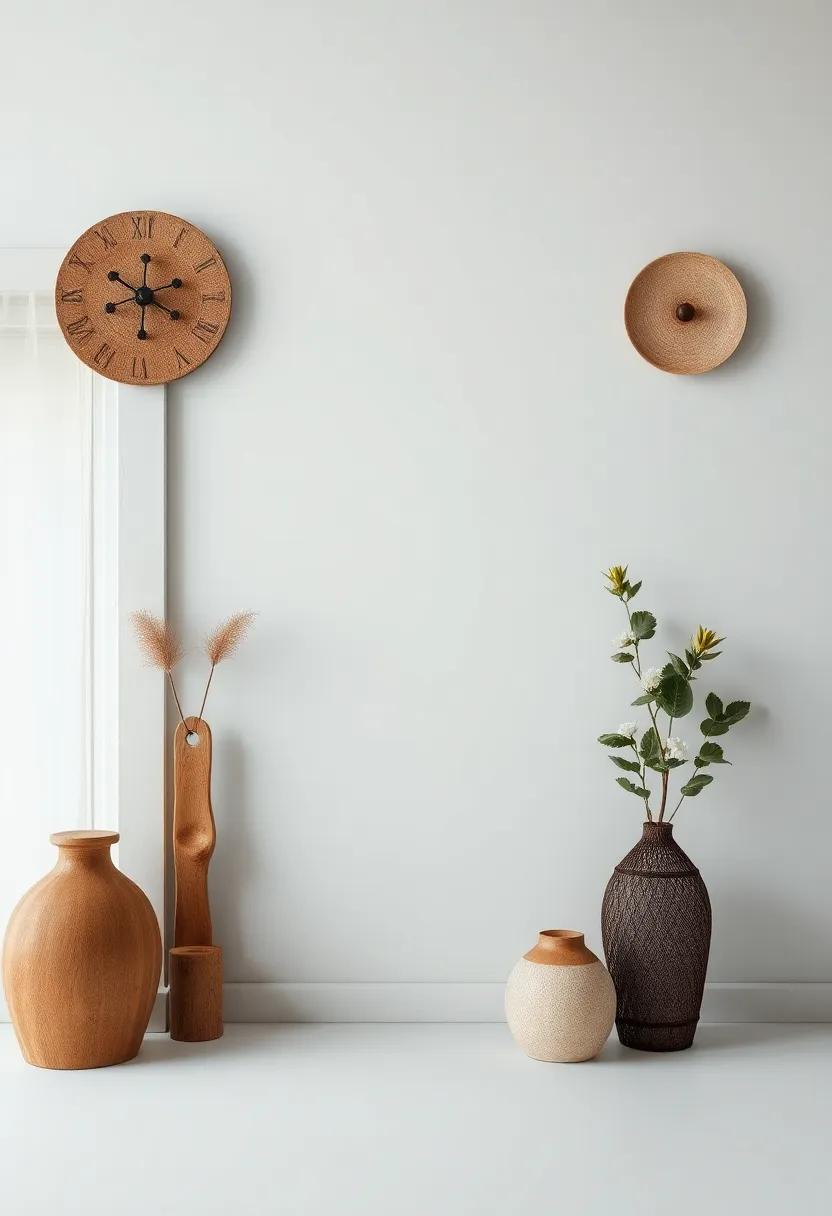
incorporating vintage decor accents into your farmhouse-inspired open concept living room and kitchen can add character and charm, creating a harmonious space where old meets new. Start by selecting focal pieces that tell a story—think distressed wooden tables, repurposed barn doors, or even antique kitchenware displayed on open shelves. These elements not only enhance the aesthetic but also serve as conversation starters. Complement these with an array of textiles such as lace-trimmed table runners or woven baskets that add layers of texture and warmth.
To further accentuate the farmhouse vibe, consider introducing a curated selection of vintage accessories into your design. Items like retro glass jars, rustic wall art, or vintage signs can seamlessly integrate with contemporary finishes. It’s essential to strike a balance, allowing vintage pieces to shine without overwhelming the space. Incorporate these accents in subtle yet effective ways: hanging an old clock above the mantel,placing a collection of mismatched chairs around the dining table,or utilizing a distressed dresser as a kitchen island. Such thoughtful arrangements will create a welcoming atmosphere that feels both nostalgic and inviting.
Blending Modern Essentials with Classic Farmhouse aesthetics
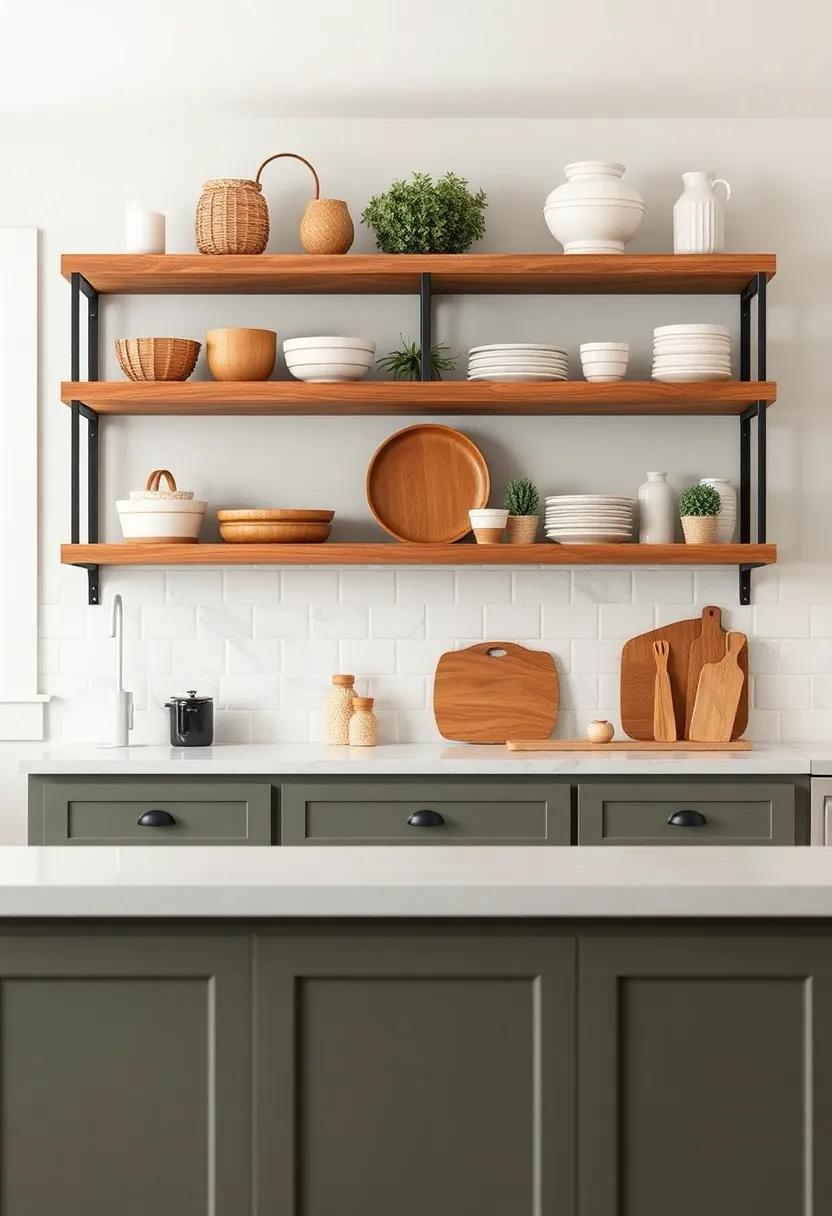
Incorporating a fresh take on traditional design, the blend of modern essentials with classic farmhouse aesthetics creates a cozy yet complex atmosphere.Emphasizing open spaces allows natural light to pour in,enhancing the rustic charm. Key elements that achieve this harmonious balance include:
- Neutral Color Palettes: Soft whites, warm beiges, and muted greys provide a calming backdrop, perfect for accentuating both new and vintage pieces.
- Natural Materials: Embrace reclaimed wood, stone accents, and organic textiles to add texture and authenticity.
- Modern Fixtures: Sleek, streamlined modern fixtures like pendant lights can complement classic furniture, creating a focal point that draws the eye.
This fusion not only highlights functional design but also tells a story of comfort and history.Furniture choices play a crucial role, where farmhouse tables can be paired with modern chairs providing visual intrigue. A well-thought-out arrangement can enhance both style and usability, achieved by:
| Furniture Type | Style Depiction |
|---|---|
| Dining Table | Reclaimed wood with a polished finish |
| Chairs | Upholstered modern chairs with farmhouse colors |
| Coffee Table | Industrial metal frame with a rustic wood top |
By thoughtfully selecting the right pieces and colors, each component seamlessly fits together, offering a unique space that marries the warmth of farmhouse living with the sleekness of contemporary design.
Crafting Open Spaces with Inviting Area Rugs and Textiles
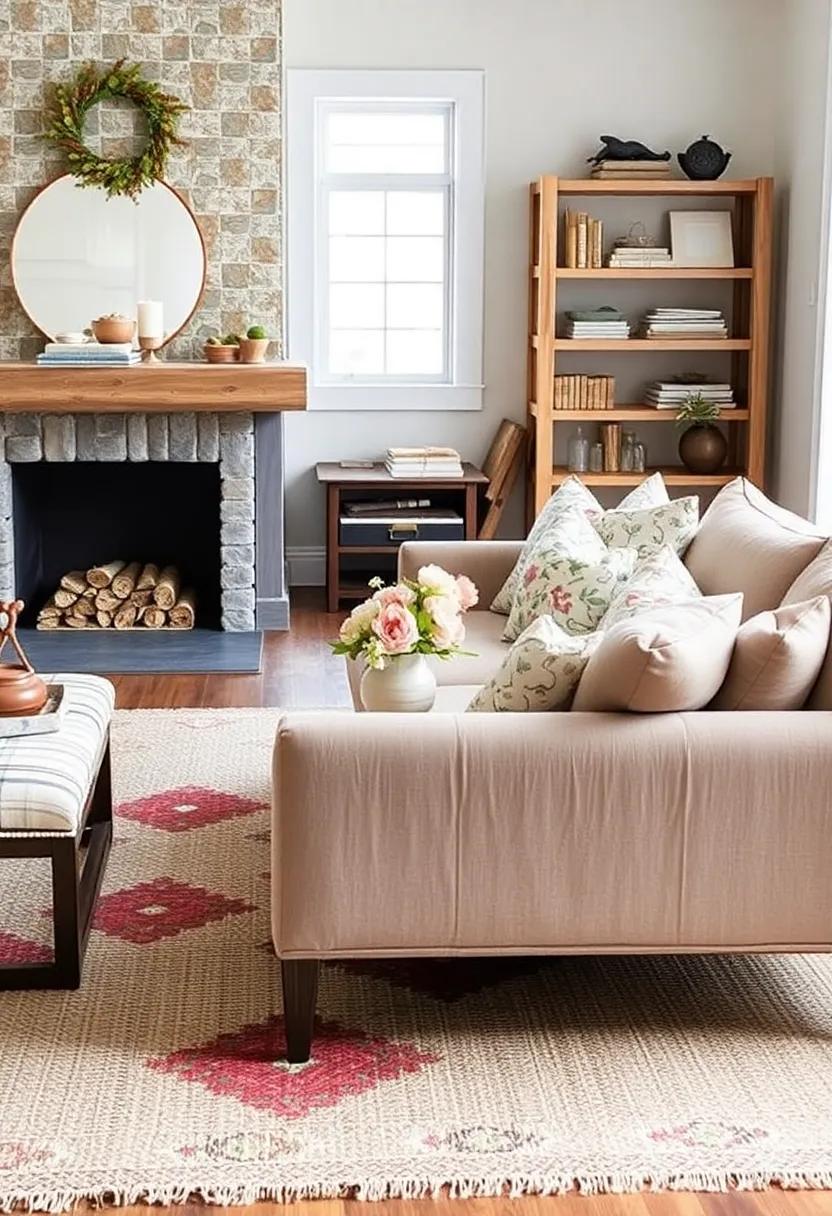
In crafting open spaces, the choice of area rugs and textiles plays a pivotal role in unifying the aesthetic within farmhouse-style designs. Soft, natural fibers such as cotton and wool not only provide warmth underfoot but also enhance the inviting feel that characterizes such environments. Consider layering rugs to create depth and texture, paired with varied textile accessories like throw pillows and blankets that echo the color palette of your open concept living space. This seamless blend brings a cozy charm while also serving practical needs, like defining distinct areas within the larger room.
To further enhance the rustic appeal, look for elements that speak to the farmhouse ethos. Burlap, linen, and bold patterns can open conversations among your decor, guiding guests through the living area to the kitchen. utilizing textiles that reflect nature, such as botanical prints or plaid, can harmoniously connect indoor and outdoor settings, reinforcing a lifestyle that appreciates simplicity and functionality.Below is a quick overview of textile choices and their features for an inviting farmhouse atmosphere:
| Textile Type | Features |
|---|---|
| Cotton | Soft, breathable, and easy to clean |
| Wool | durable, warm, and luxurious |
| Burlap | Rugged texture, rustic feel, biodegradable |
| Linen | natural luster, breathable, and softens over time |
Exploring Farmhouse-Inspired Lighting Choices for Inviting Ambiance
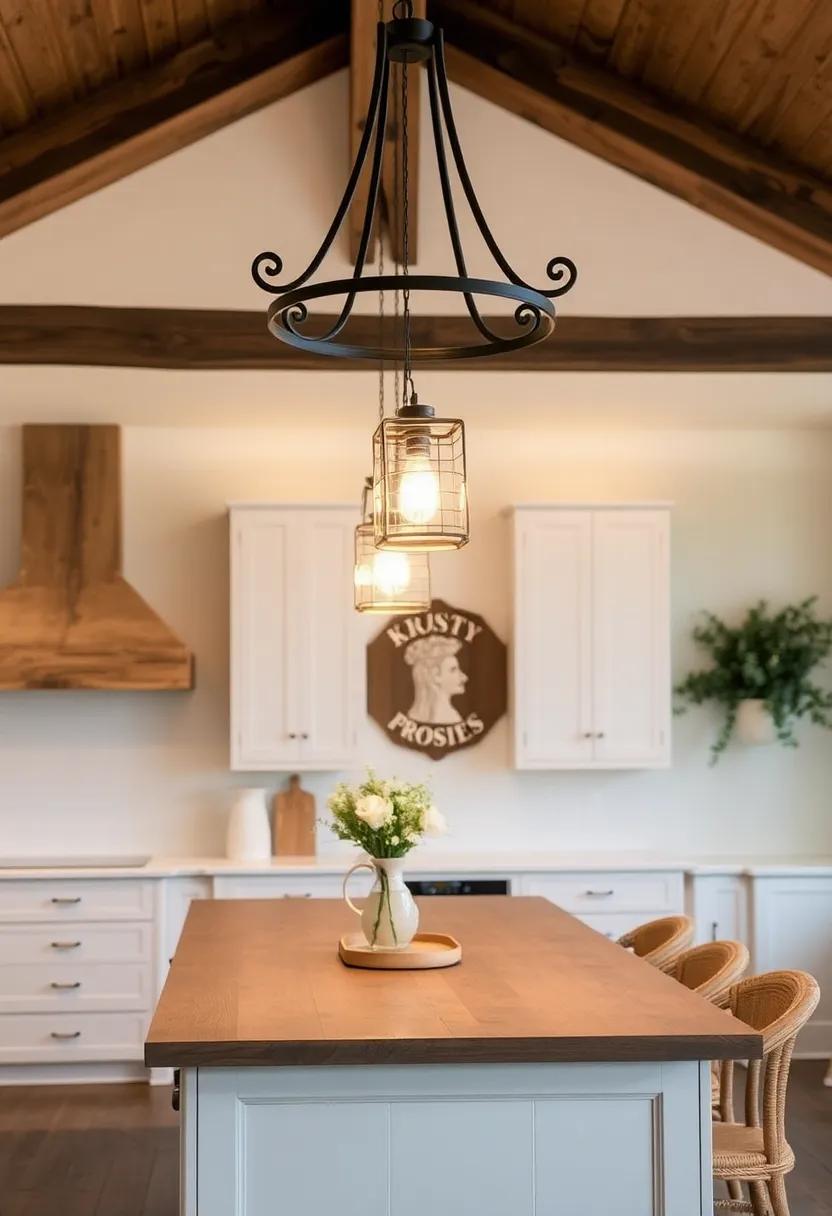
In the pursuit of a warm and welcoming atmosphere, lighting plays a pivotal role in defining the character of farmhouse-inspired spaces. Picture rustic pendant lights suspended over an inviting kitchen island, their vintage charm drawing the eye and casting a warm glow. The interplay of soft light and natural materials enhances the earthy tones often found in farmhouse decor. Consider shiplap fixtures or eye-catching wrought iron chandeliers that can serve as stunning focal points, seamlessly blending functionality and aesthetics. Incorporating dimmer switches can further enhance the mood, allowing homeowners to adjust lighting levels for more intimate gatherings or festive family dinners.
To elevate the farmhouse ambiance further, explore unique lighting accents that highlight various areas of your open concept living space. Table lamps with burlap shades or wall sconces made from reclaimed wood can help soften harsh overhead lighting and create cozy nooks. Utilizing string lights along beams or railings adds a touch of whimsy, enveloping the space in charm as dusk settles in.For more dramatic effects, identify lighting that incorporates Edison bulbs, which resonate with the vintage aesthetic and sprinkle the space with a nostalgic glow. With the right choices, lighting becomes not merely functional but an artistic element that speaks to the heart of farmhouse-style design.
integrating Functional Kitchen Islands as Social Hubs in Open Areas
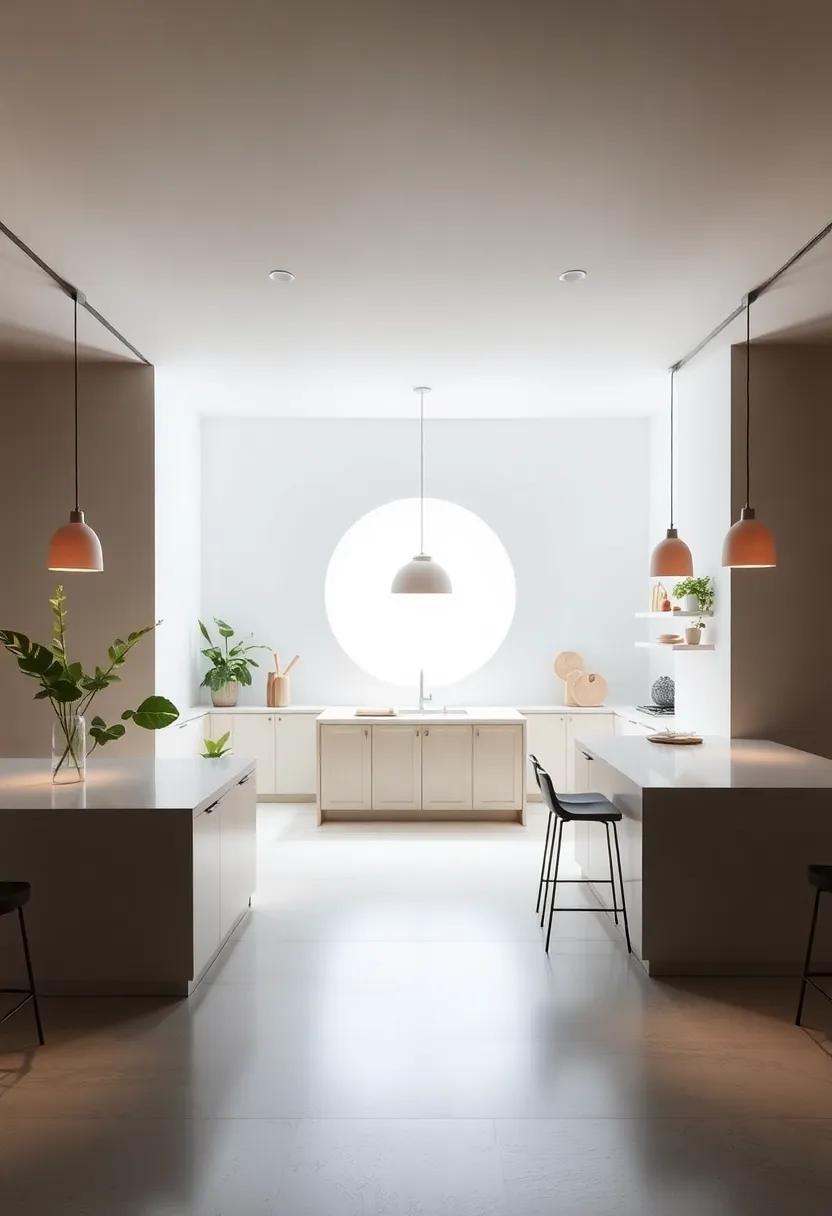
In the heart of open-concept living spaces, functional kitchen islands play an essential role in forming social hubs that encourage interaction and connection. These versatile structures transcend mere utility, transforming kitchens into inviting gathering places. With a touch of farmhouse charm, a well-designed island can serve multiple functions, including:
- Casual dining: Providing a relaxed spot for meals and snacks.
- Cooking Engagement: Allowing family and friends to participate in meal preparation.
- Workstation: Acting as a surface for homework or crafting activities.
To enhance the farmhouse aesthetic, consider incorporating warm, natural materials like reclaimed wood or stone for the island surface. This invites a rustic vibe while offering durability.Additionally, the layout should be designed thoughtfully to ensure traffic flow is seamless, connecting the kitchen with the living areas effortlessly.An appealing centerpiece, such as a charming pendant light or a decorative centerpiece, can further enhance the social atmosphere.Here’s a simple table to highlight key features:
| Feature | Benefit |
|---|---|
| Open Layout | Encourages conversation and togetherness |
| Multi-purpose Surface | Adaptable for cooking, dining, or work |
| Warm Materials | Creates an inviting and cozy atmosphere |
Curating Open Concept Spaces with Thoughtful layouts and Flow
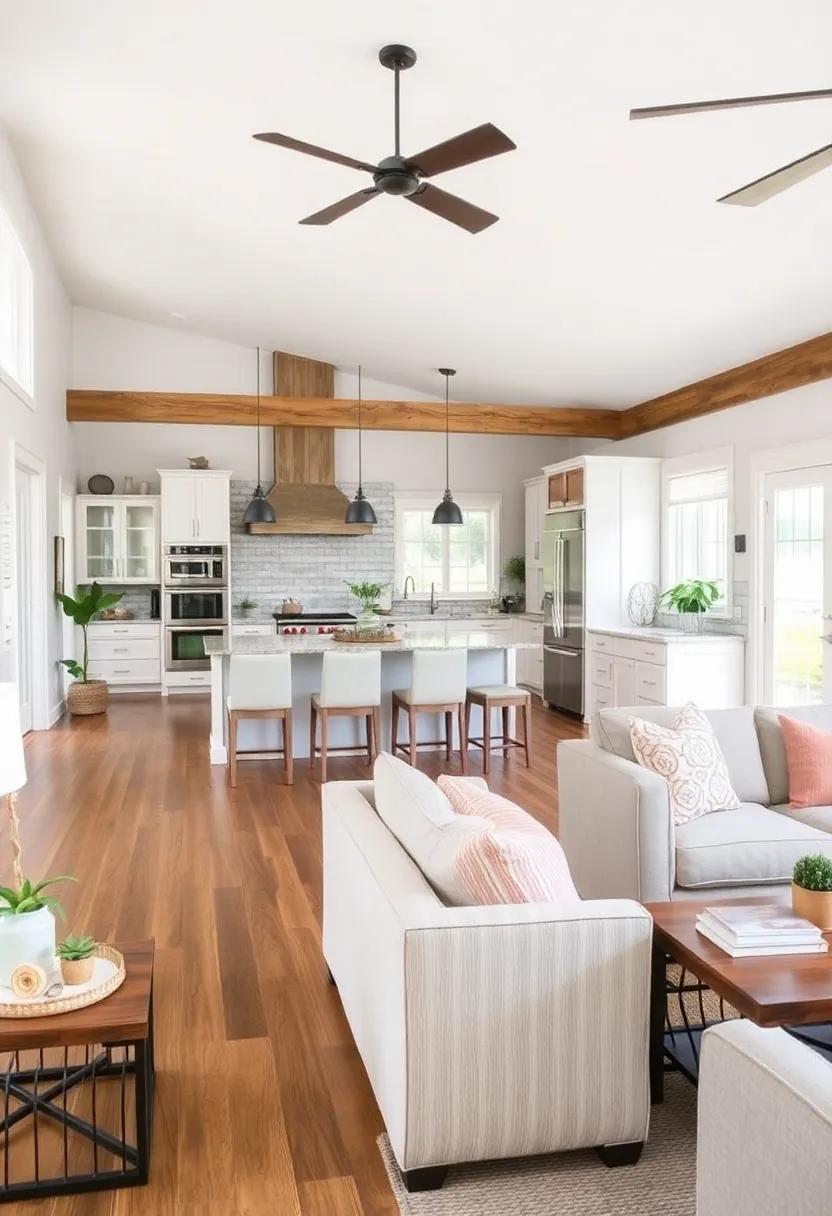
Creating harmony in an open concept space requires a delicate balance between aesthetics and functionality. When designing a farmhouse-style living room and kitchen,consider using a mixture of textures and colors to create distinct yet cohesive zones. Start by incorporating natural materials such as reclaimed wood, stone accents, and soft textiles to instill warmth and comfort. To enhance flow,keep traffic patterns in mind; strategically position furniture and fixtures to guide movement naturally from one area to another. Consider utilizing zones with themed decor or color variations that delineate the living area from the kitchen while complementing each other:
- Living Area: Cozy couches, rustic coffee tables, and soft area rugs.
- Kitchen: Open shelving, natural wood cabinetry, and farmhouse sinks.
- Transitional Elements: Bar stools that merge the two spaces and strategically placed plants.
Your layout should also account for the everyday needs of your household. An effective way to facilitate this is through multi-functional furniture that supports a variety of activities.Implementing an island in the kitchen not only provides an abundance of workspace but serves as a casual dining area and a gathering point for family and friends. A well-planned layout could greatly benefit from a functional table where meals can be enjoyed together without feeling isolated from the rest of the home. The following table illustrates key characteristics for optimum layout designs:
| Area | Key Features |
|---|---|
| Living Room | Cozy seating, warm lighting, and a unified theme. |
| Kitchen | Ample counter space, integrated appliances, and easy access. |
| Flow Connections | Clear pathways, open sightlines, and effective transitions. |
Creating Inviting Dining Areas That Connect with Kitchen Spaces
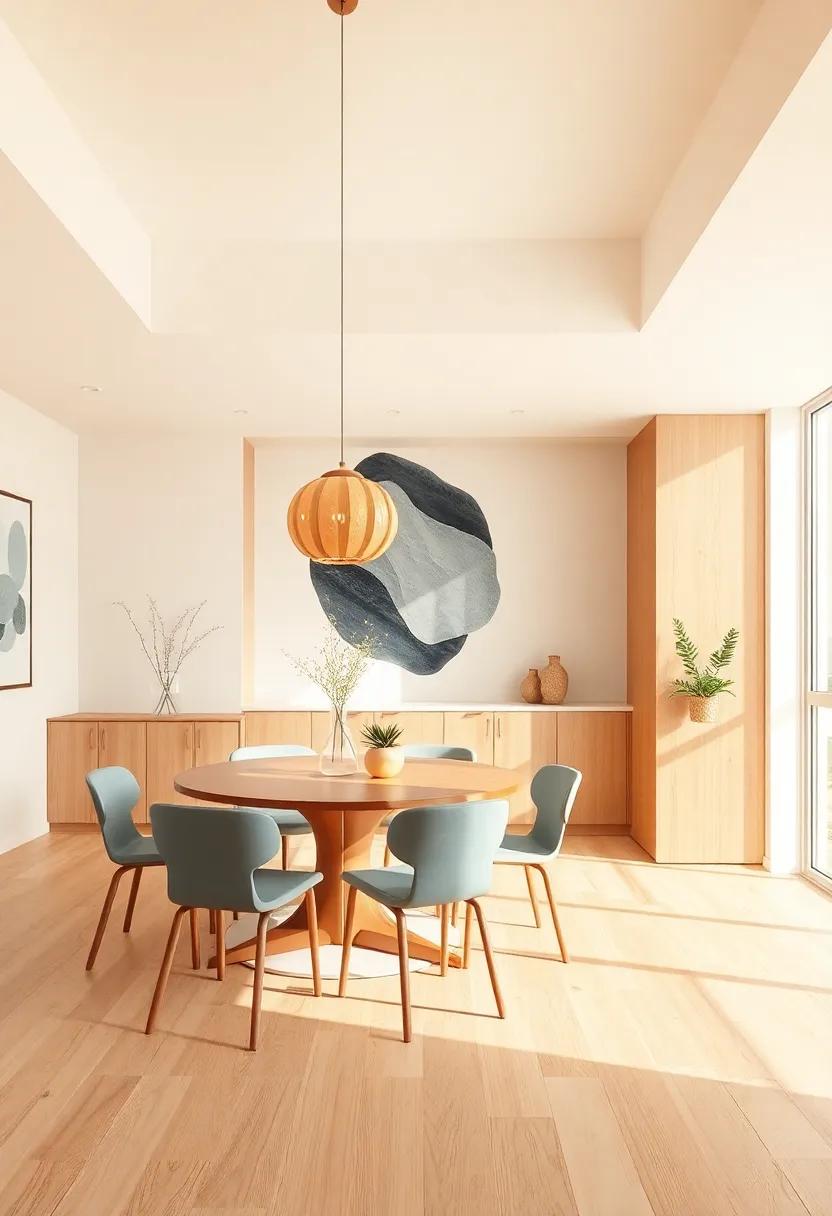
To create a seamless transition between dining areas and kitchen spaces, it’s essential to consider the flow and functionality of the space. By incorporating natural materials like reclaimed wood,stone,and soft textiles,you can enhance the cozy,farmhouse aesthetic. Start by using an inviting color palette that includes warm earth tones and soft pastels, which can be reflected in table settings, wall colors, and decorative accents. Here are some key elements to consider:
- Open Layout: ensure the dining area is easily accessible from the kitchen, promoting a smooth movement between the two.
- Unified Design: Use similar fixtures and finishes in both spaces to create a cohesive look.
- Functional Furniture: Opt for extendable tables that can accommodate both everyday meals and gatherings, allowing adaptability.
Along with aesthetics, enhancing the atmosphere of your dining area can be achieved through thoughtful lighting choices and decorative elements. Adding a stunning chandelier or pendant lights above the dining table not only defines the space but also adds a touch of sophistication. Incorporating plants can bring life to the environment, while decorative shelves or rustic wall art can provide a charming farmhouse feel. Consider the following enhancements:
| Enhancement | Description |
|---|---|
| Layered Lighting | Combine ambient, task, and accent lighting for a warm glow. |
| Textured Textiles | Use fabrics like linen or cotton for tablecloths and cushions to add warmth. |
| Seasonal Decor | Change decor elements with the seasons for a fresh look. |
Utilizing Plants and Greenery to Bring Life to Open Designs
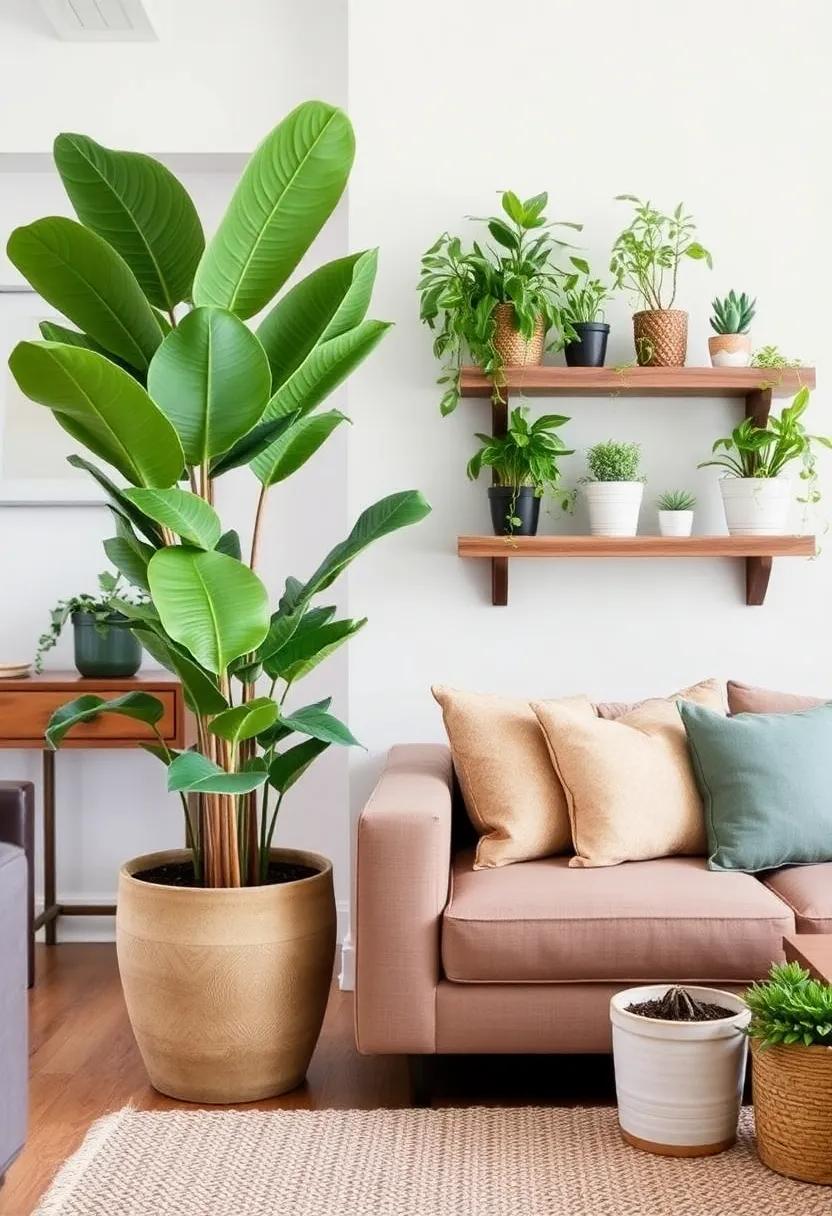
Incorporating plants and greenery into open-concept spaces can transform the ambiance, infusing warmth and vibrancy into your farmhouse-style living spaces. Indoor plants not only purify the air but also add texture and color, creating a harmonious balance between modern and rustic design elements. Consider these popular options to elevate your décor:
- Fiddle Leaf Fig: Tall, elegant, and striking, these plants make a statement in any corner.
- Succulents: Low-maintainance and diverse, they can thrive in various environments.
- Herb Gardens: Functional and aromatic, they bring life to kitchen spaces while being practical for culinary uses.
Creating visual interest can also be achieved through strategic placement of greenery. Pair large plant pots with rustic furniture and natural materials, or opt for floating shelves adorned with small potted plants. This not only enhances the open concept but also fosters a connection to nature, making your space feel more inviting. To further emphasize the beauty of your greenery,consider creating a designated plant display area:
| Plant Type | Light Requirements | Care level |
|---|---|---|
| Fiddle Leaf Fig | Bright,indirect light | Moderate |
| Succulents | Full sun | Low |
| Herbs | Partial sun | Moderate |
Incorporating Multi-Functional Furniture for Smart Space Solutions
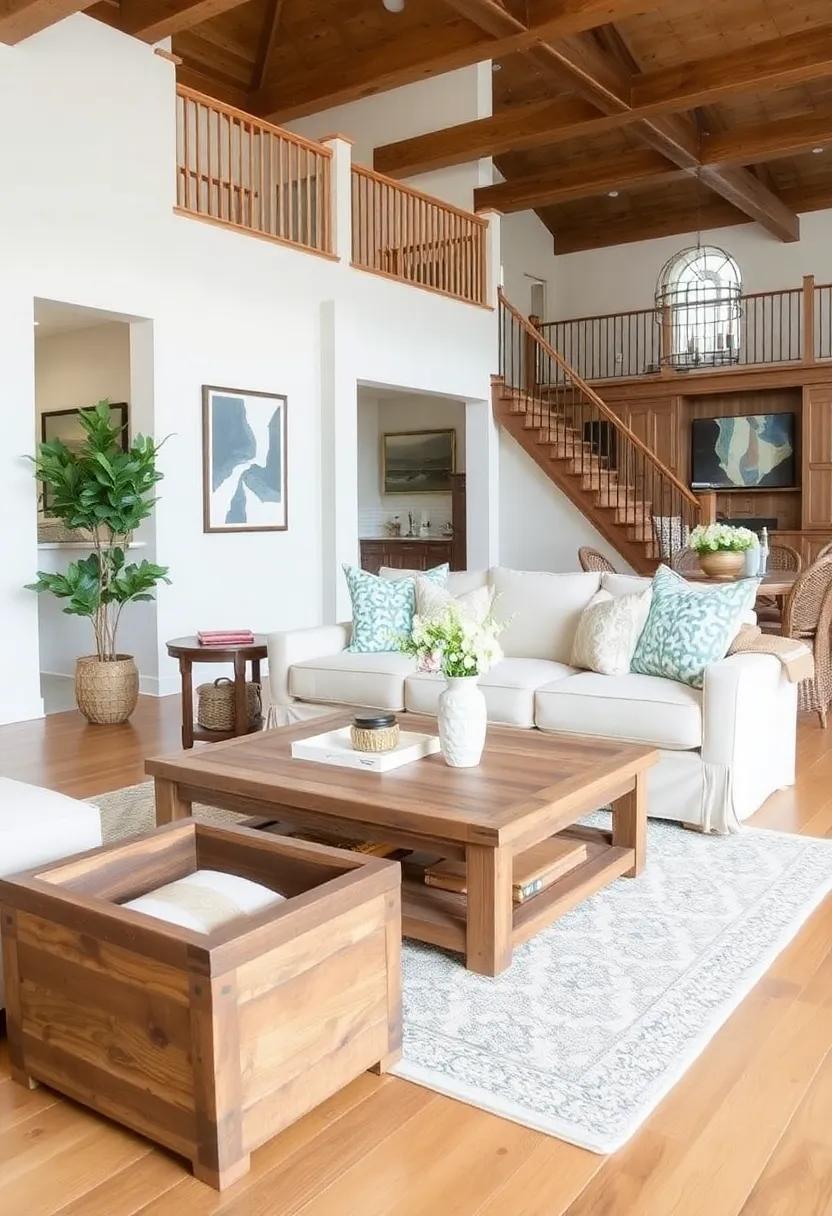
In open concept living spaces,multi-functional furniture serves as a key element in maximizing both utility and aesthetic appeal. A well-chosen piece can transform a room, providing seating while also doubling as storage or workspace. As an example, consider a rustic coffee table that features hidden compartments or an ottoman that can be used for both footrest and seating when needed. These smart solutions not only save space but also maintain the cozy, inviting charm typical of farmhouse-style designs.
Another innovative way to integrate functionality without sacrificing style is through the use of modular furniture. This flexible approach allows homeowners to rearrange their space effortlessly, accommodating everything from family gatherings to quiet evenings. Here are some common multi-functional elements to consider:
- Convertible sofa beds – Perfect for hosting overnight guests.
- Bench seating with storage – Adds extra seating while keeping clutter at bay.
- Drop-leaf tables – Expands for gatherings and folds down for an unobtrusive look.
Enhancing Open Spaces with Warm and Inviting Color Combinations
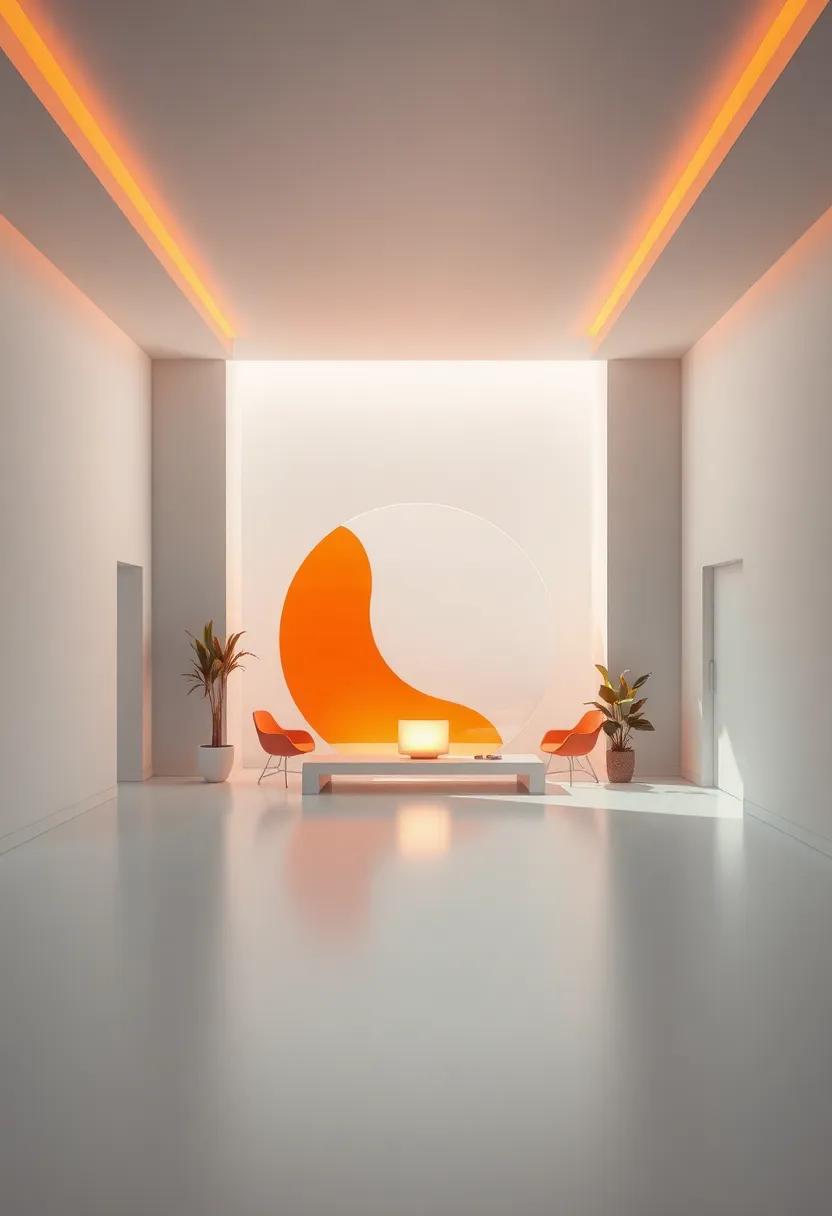
Incorporating warm and inviting color combinations can transform open spaces into serene havens that exude comfort and charm. Soft hues like creamy whites, muted earth tones, and gentle pastels can provide a welcoming backdrop, allowing natural light to enhance the overall ambiance. Bold accents, such as deep greens or rich burgundies, can be strategically placed in decor items, creating delightful focal points that draw the eye while maintaining a harmonious balance. By layering textures and materials, such as distressed wood and vintage metal, these color schemes come to life, ensuring an inviting atmosphere that is both stylish and functional.
To achieve a cohesive farmhouse-style aesthetic, think carefully about the juxtaposition between colors and furniture. Elements like:
- Reclaimed wood accents: Enhance rustic charm.
- Neutral textiles: Offer a soft contrast.
- Vintage decor pieces: Add character and history.
when considering the layout, utilizing colors that flow seamlessly from the living area to the kitchen can create a sense of unity. A well-planned color palette not only reflects your personal style but also enhances the functionality of the space,encouraging relaxation and connection among family and friends. Explore the use of paint and decor to breathe new life into these communal environments.
Defining Zones in Open Floor Plans with Farmhouse-style Decor
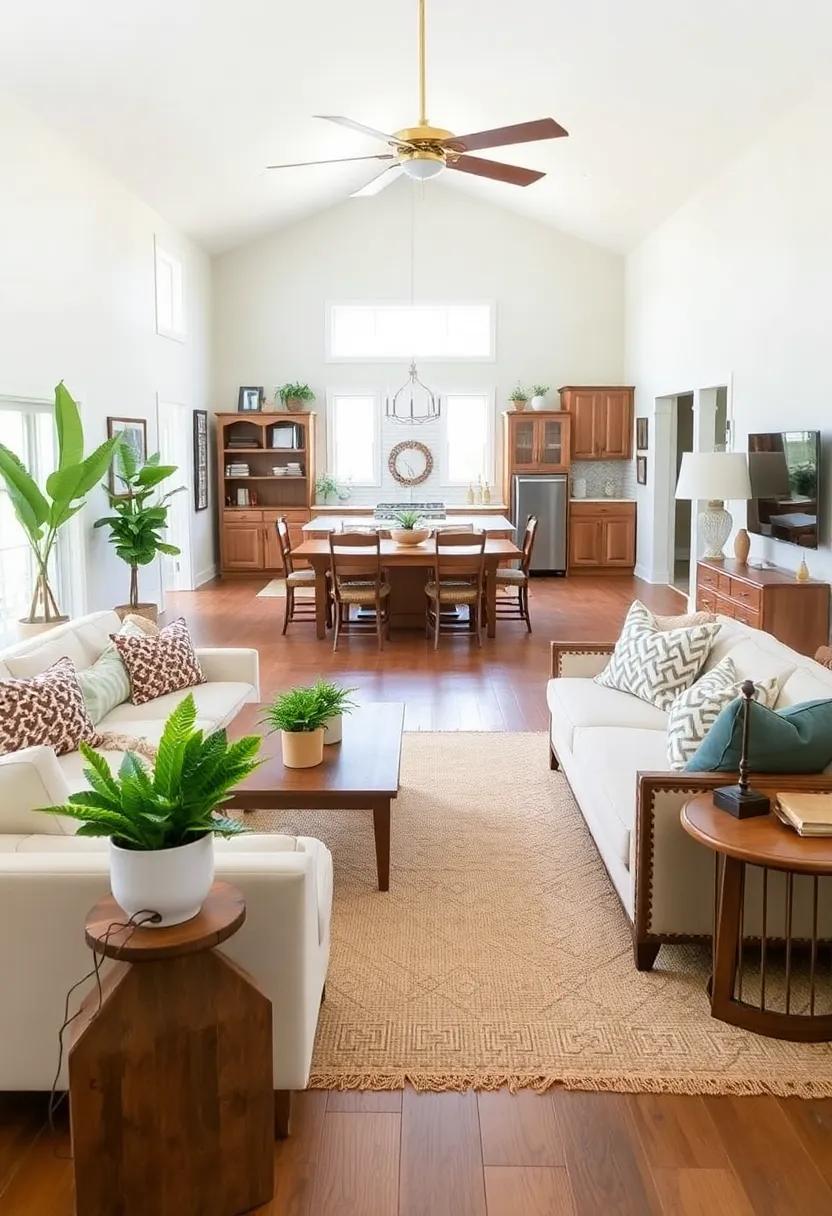
Open floor plans offer versatility, yet can feel overwhelming without defined areas. Utilizing farmhouse-style decor creates natural boundaries in these spaces. For instance, you can opt for area rugs to demarcate a cozy living area or position a striking console table between the kitchen and living room. This not only visually divides the two zones but also complements the rustic appeal of the farmhouse aesthetic. Accessories like tall plants or vintage style bookshelves can further enhance these zones, providing both height and character, while still maintaining an airy feel.
Incorporating furniture that serves dual purposes can also aid in defining spaces without sacrificing openness. Consider adding wooden benches at the dining area that can double as additional seating in the living room or choosing a large farmhouse table that anchors the dining zone. To enhance the warmth and comfort associated with farmhouse decor, look for items with natural textures such as burlap or cotton, which can add a tactile element that draws people in. The fusion of these practical decor choices creates an inviting and functional environment,allowing for both relaxation and social interaction while maintaining the hallmark charm of farmhouse styling.
Using Open Shelving to Showcase Farmhouse Kitchen Charm
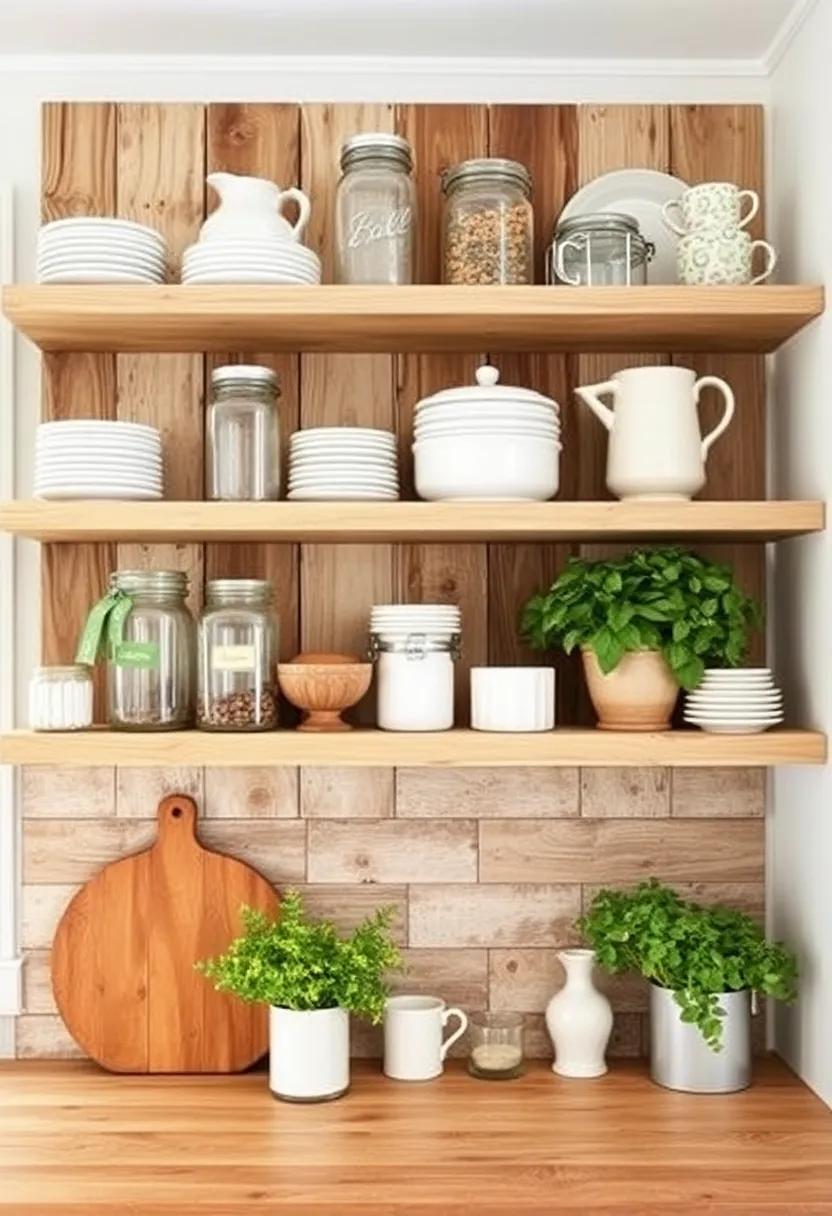
Open shelving is more than just a practical solution for storage; it’s an aesthetic choice that breathes life into the farmhouse kitchen. By carefully arranging your dishware,glassware,and pantry items,you can create a visually stunning display that invites warmth and character into your space. Consider incorporating elements such as:
- Rustic Wooden Boards: Use reclaimed wood or distressed finishes for shelves to enhance the vintage vibe.
- Vintage Containers: Showcase mason jars, antique measuring cups, or family heirlooms for a personal touch.
- Natural Accents: Add potted herbs or fresh flowers to infuse a fresh, organic feel that complements the rustic charm.
When designing your open shelving, balance is key. Avoid overcrowding the shelves, which can lead to a cluttered appearance. Instead, alternate between different heights and textures to keep the eye engaged. Here’s a simple yet effective layout to help visualize that balance:
| Position | Item Type |
|---|---|
| Top Shelf | Large bowls, decorative items |
| Middle Shelf | Dishes, glassware, vintage containers |
| Bottom Shelf | cookbooks, baskets, potted herbs |
This structured yet inviting approach creates an easy access point for everyday items while still serving as a curated display that captures the essence of farmhouse living.
Achieving Balance with Contrasting Elements in Open Concepts
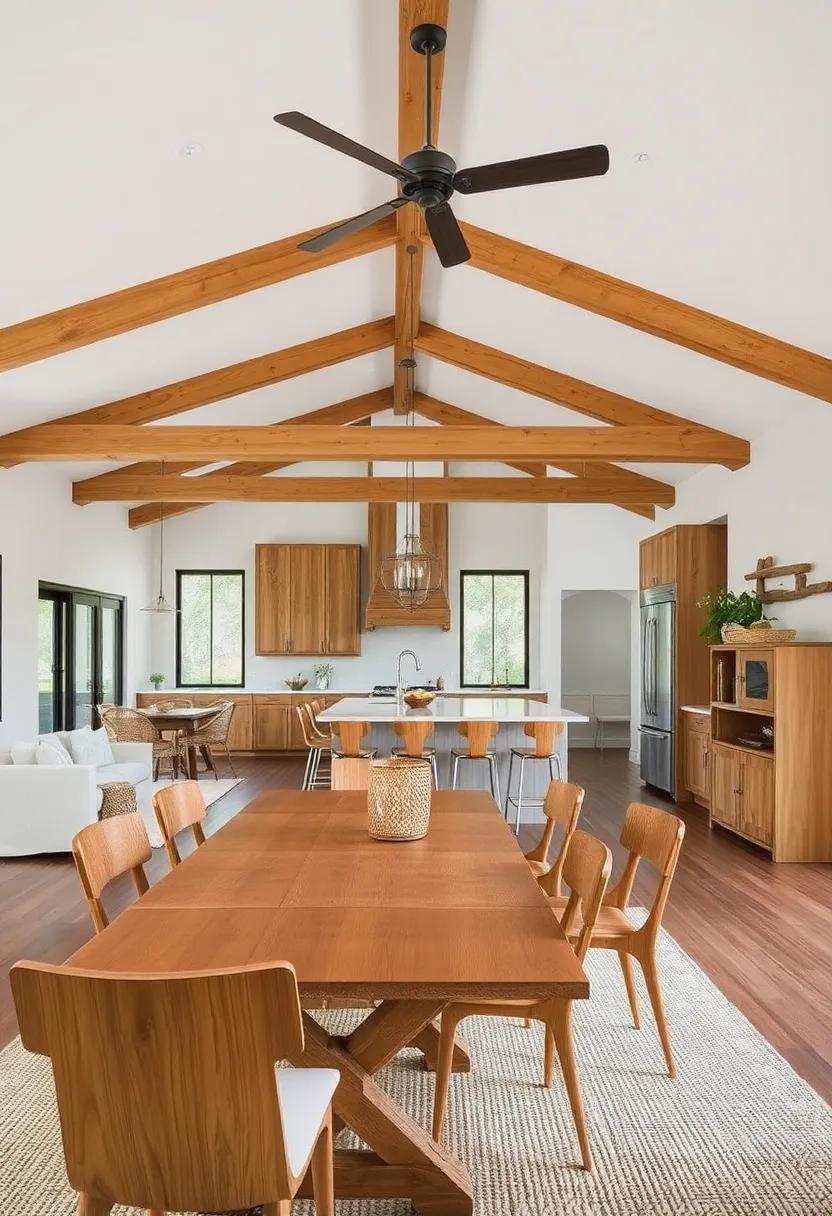
In the realm of open concept designs, juxtaposing contrasting elements can breathe life into a space that feels cohesive while still celebrating individuality.By seamlessly integrating different textures, colors, and materials, homeowners can create areas that are not only functional but also visually intriguing. Natural wood beams paired with sleek metal accents can evoke a rustic charm while maintaining a contemporary edge. Warm earth tones blended with crisp whites can foster an inviting atmosphere that invites relaxation. This balance can be achieved through careful selection of furniture and decor that anchor the space, allowing unique pieces to shine without overwhelming the senses.
Consider using focal points to draw the eye and establish harmony within the design. As an example,a stunning farmhouse table can serve as a centerpiece in the kitchen,complemented by modern,minimalist chairs that add a fresh twist. In addition, layering materials—such as a plush rug beneath rustic wooden dining chairs—introduces warmth and depth. Another key element is lighting; a vintage chandelier can contrast beautifully with industrial pendant lights, elevating the overall aesthetic. Here’s a quick comparison of materials to consider:
| material | Vibe |
|---|---|
| Weathered Wood | cozy & Inviting |
| Brushed Steel | Modern & Clean |
| Hemp Fabrics | Natural & Earthy |
| Glass Accents | Bright & Airy |
Personalizing Your Space with Family Heirlooms and Unique finds
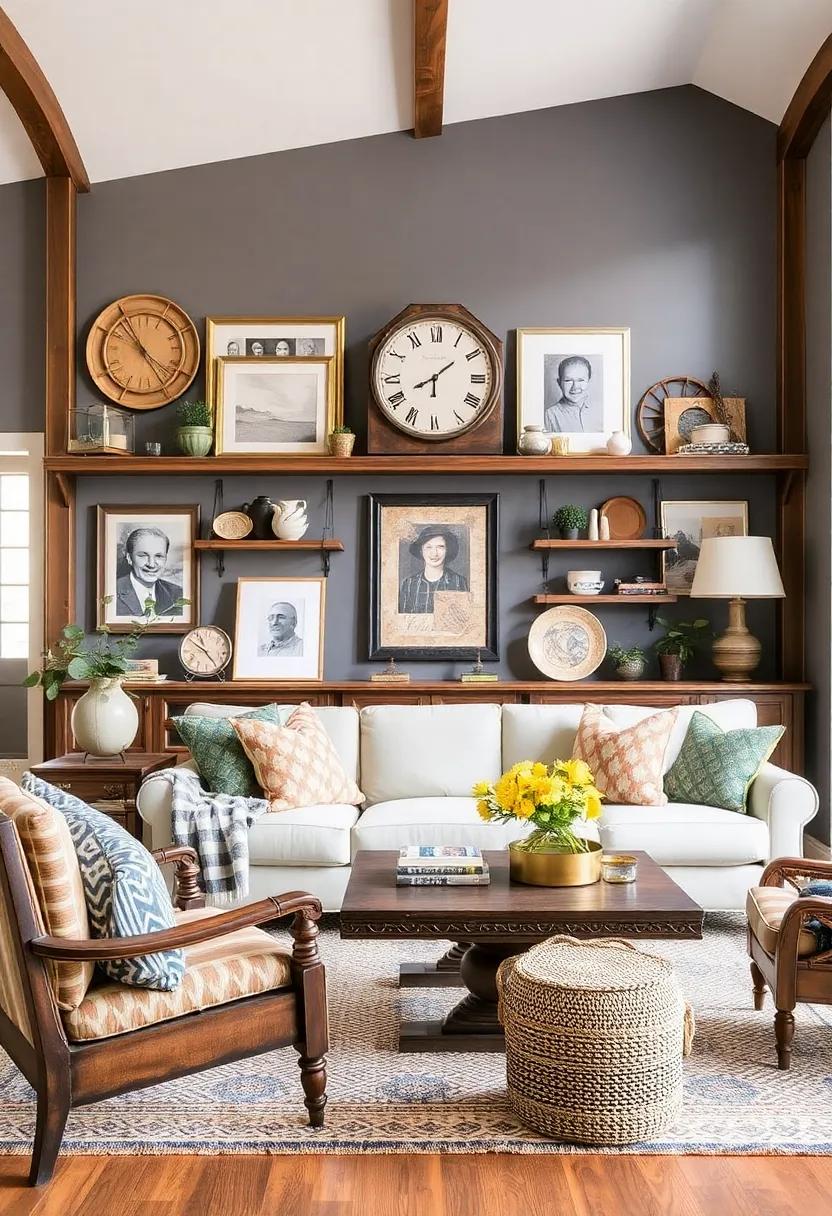
Incorporating family heirlooms and unique finds into your farmhouse-style open concept living space adds a personal touch that transforms the area into a loving and inviting environment. Items such as vintage quilts, hand-crafted pottery, or reclaimed wood furniture pieces can serve as both functional and decorative elements.When arranging these pieces, consider creating a focal point, like a prominent heirloom clock or a collection of antique dishes, displayed on rustic shelves. Accent these finds with complementary decor to enhance their charm,making your living space feel warm and lived-in.
Additionally, the beauty of using family treasures lies in their stories, which can spark conversations and create connections. To showcase these items effectively, try the following ideas:
- Gallery Wall: Combine framed family photos with unique art pieces for a dynamic visual display.
- mixing Materials: Pair heirlooms with modern accents, such as sleek metal fixtures or contemporary lighting, to create a balanced aesthetic.
- seasonal Rotations: Change out decor items periodically,showcasing different heirlooms to keep the space feeling fresh and engaging.
Consider utilizing an aesthetic balance by thoughtfully positioning your heirlooms across the room, harmonizing textures and colors. Creating a cohesive look can be achieved with a simple layout like the one below:
| Item Category | Source | placement Idea |
|---|---|---|
| Textiles | Family Quilt | Throw over a comfy couch |
| Tableware | Antique Dishes | Display in a curated cabinet |
| Furniture | Reclaimed Wood Table | Centerpiece of the dining area |
Imagining Outdoor Connections to Enhance Indoor-Outdoor Flow
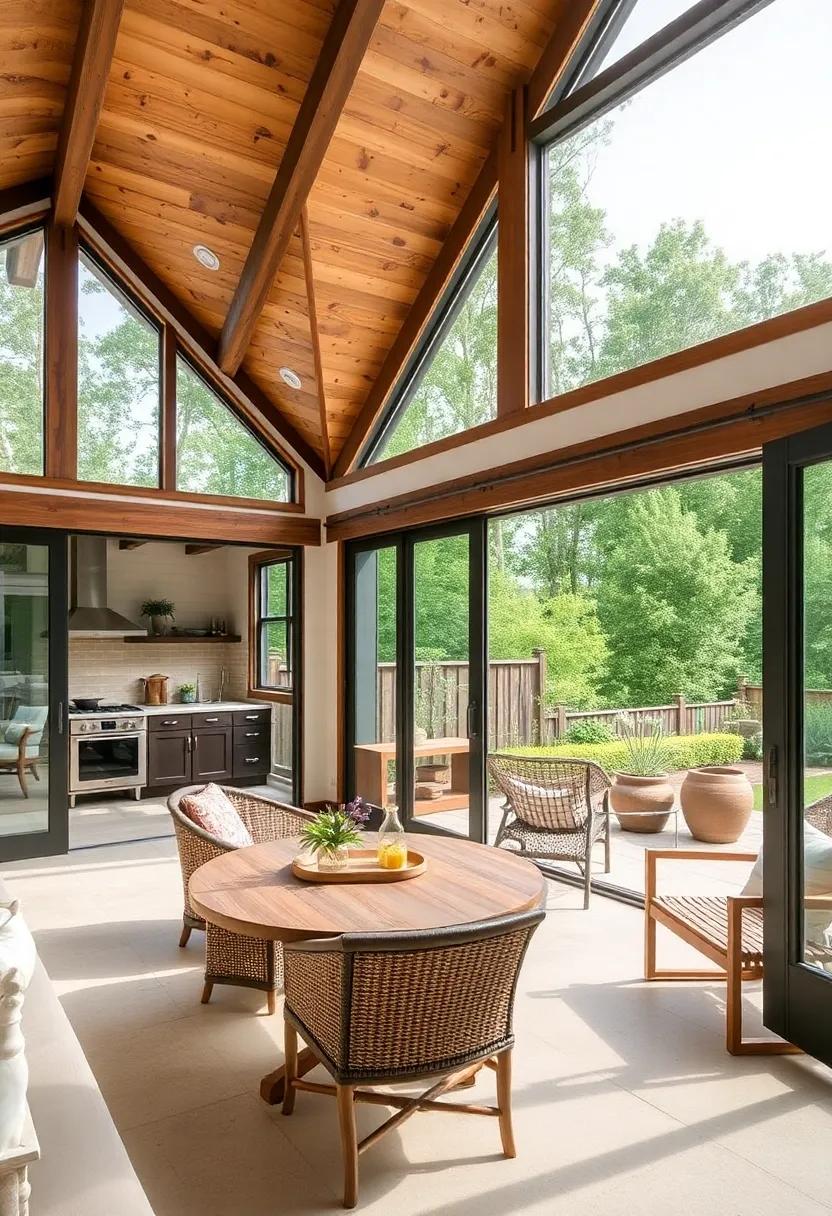
In the pursuit of harmonizing indoor and outdoor experiences, farmhouse-style designs offer a delightful canvas for creativity. Consider large, expansive windows that frame scenic views, allowing soft natural light to grace your living spaces while inviting the greenery outside to intrude upon your home. Sliding glass doors seamlessly connect kitchens to al fresco dining areas, promoting a free flow between cooking and socializing under the sun. Incorporating elements like wooden beams and reclaimed barn doors not only enhances rustic charm but also draws the essence of the outdoors inward, fostering a warm and inviting atmosphere.
Integrating outdoor landscaping can further enhance this connection. Potted herbs or a vertical garden placed near kitchen windows create a delightful sensory experience, infusing the air with fresh aromas. Think about installing a patio area that’s easily accessible from the kitchen, creating an ideal space for casual gatherings and evening relaxation. An inviting fire pit or comfortable seating can transform your outdoor area into another room of the house, making fresh air and starry skies an integral part of your living experience. Here’s a quick look at elements to consider:
| Feature | Benefit |
|---|---|
| Large Windows | Brings in natural light and stunning views |
| Sliding Glass Doors | Creates easy transition between indoors and outdoors |
| Potted herbs | Adds freshness and flavor to indoor cooking |
| Outdoor Seating | Encourages social interactions and relaxation |
As we conclude our exploration of farmhouse-style designs in open concept living spaces, it becomes clear that this aesthetic transcends mere decor; it’s an invitation to cultivate warmth and connection in our everyday lives. By blending rustic charm with modern functionality, open concept living rooms and kitchens transform into welcoming spaces where family gatherings, late-night conversations, and culinary adventures can unfold seamlessly.In embracing the elements of farmhouse style—wooden beams, natural textures, and a soft, neutral palette—we create environments that not only reflect our personal tastes but also foster a sense of belonging. Whether you’re drawn to the timeless appeal of vintage accents or the simplicity of contemporary finishes, the beauty of farmhouse design lies in its adaptability and its ability to tell a story unique to each home.As you embark on your own journey to create a welcoming space,remember that it’s not just about the aesthetic; it’s about the life that happens within those walls.Let your creativity flourish, invite the charm of the countryside into your urban dwelling, and embrace the heartwarming spirit of farmhouse living. Here’s to crafting a home that feels like a hug—comforting, inviting, and truly your own.


